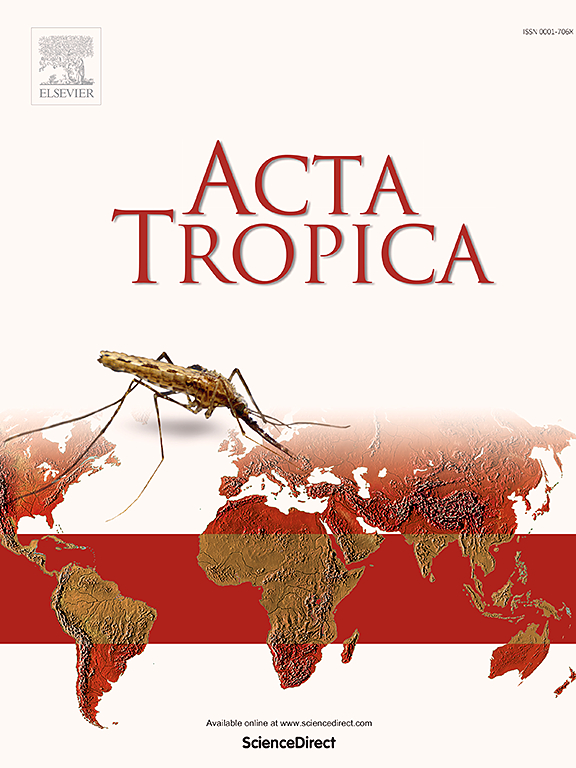巴西Paraíba屠宰场工人抗刚地弓形虫抗体水平升高:对职业健康的影响
IF 2.5
3区 医学
Q2 PARASITOLOGY
引用次数: 0
摘要
目的是评估抗t病毒的流行程度。在Paraíba状态下屠宰场工人体内的弓形虫抗体以及与该原虫感染相关的可能因素。从该州6个市的170名屠宰场工人中采集了血液样本,并在样本采集期间对研究参与者使用了流行病学问卷。对血样进行鉴定、冷藏,并送去使用免疫荧光抗体试验(IFAT)进行血清学分析。抗t病毒的流行。工人弓形虫IgG阳性率为77.6% (132/170);95% CI:±0.752),滴度范围为1:16 ~ 1:8192。与感染相关的因素和可能的后果包括教育水平低:文盲(患病率1.512;95% ci 1.083-2.111);基础教育(PR 1.46;95% ci 1.092-1.953);怀孕困难(PR = 1.23, 95% CI = 1.061 ~ 1.426)。我们得出结论,Paraíba屠宰场工人中弓形虫的患病率很高,工作环境可能会造成更高的风险,因为他们直接暴露于受污染的组织。低教育水平与弓形虫血清阳性之间的关系加强了在工作场所采取预防措施和健康教育的必要性。本文章由计算机程序翻译,如有差异,请以英文原文为准。
Elevated anti-Toxoplasma gondii antibody levels among slaughterhouse workers in Paraíba, Brazil: Implications for occupational health
The objective was to assess the prevalence of anti-T. gondii antibodies in slaughterhouse workers in the state of Paraíba and the possible factors associated with infection by this protozoan. Blood samples were collected from 170 slaughterhouse workers from six municipalities in the state, and an epidemiological questionnaire was applied to the study participants during sample collection. The blood samples were identified, refrigerated, and sent for serological analysis using the Immunofluorescent Antibody Test (IFAT). The prevalence of anti-T. gondii IgG among workers was 77.6% (132/170; 95% CI: ±0.752), with titers ranging from 1:16 to 1:8192. Factors associated and possible consequences with infection included low education level: illiterate (PR 1.512; 95% CI 1.083–2.111); elementary education (PR 1.46; 95% CI 1.092–1.953); and difficulties in conceiving children (PR 1.23, 95% CI 1.061–1.426). We concluded that there is a high prevalence of T. gondii among slaughterhouse workers in Paraíba, and the work environment may pose a higher risk as they are directly exposed to contaminated tissues. The association between low education levels and T. gondii seropositivity reinforces the need for preventive measures and health education in the workplace.
求助全文
通过发布文献求助,成功后即可免费获取论文全文。
去求助
来源期刊

Acta tropica
医学-寄生虫学
CiteScore
5.40
自引率
11.10%
发文量
383
审稿时长
37 days
期刊介绍:
Acta Tropica, is an international journal on infectious diseases that covers public health sciences and biomedical research with particular emphasis on topics relevant to human and animal health in the tropics and the subtropics.
 求助内容:
求助内容: 应助结果提醒方式:
应助结果提醒方式:


